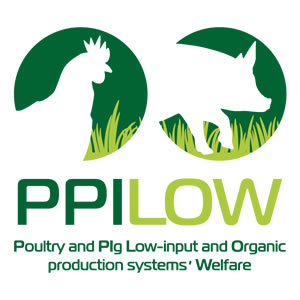PPILOW dissemination activities: news from Italy
– by Monica Coletta and Laetitia Fauconnier (AIAB)
In 2024, the dissemination activities of the main exploitable results of the PPILOW project have been led by AIAB with the active participation of all the Italian partners of the Consortium (Veterinarians without Borders,, SlowFood, University of Perugia) and a large number of stakeholders. Two technical days were dedicated respectively to animal welfare in pigs rearing systems on April 16th and poultry rearing systems on May 29th with a visit to the innovative hosting organic farms. Much interest was collected on the PPILOW experiments and on the results of on-farm trials. One of the main issues reported by farmers was the regulatory framework which is tailored on conventional indoor systems and does not valorise and sometimes hampers the efforts of organic and low-input farmers. The presence of NGOs and other stakeholders made the need of collaboration along the value chain evident. The national workshop led by AIAB in Rome was anticipated by an on-line webinar on May 27th to reflect on the present regulation framework and the issues and levers to improve organic pig and poultry production systems focusing on animal welfare. During the seminar, the main goals and outputs of the PPILOW project were presented by partners. The succeeding Workshop held in Rome on May 31st was abundant in exchanges with a large partnership including policy makers and certification bodies focusing on integrated strategies to achieve welfare in organic poultry farming avoiding of synthetic products. The discussion emphasized the need of a holistic approach and a regulation framework supporting the adoption of innovative practices tailored on organic and free-range production systems. The participants concluded that policy actions should be undertaken to raise the awareness of consumers on the benefits and positive effects on welfare of organic production systems.

© Photo AIAB
On June 21st in Talmassons (UD) in coincidence with an NPG meeting on poultry production systems, the PPILOW results were presented while the discussion focused on the needs to conciliate biosecurity measures and animal welfare practices in organic and low-input outdoor production systems. Farmers reported a limited availability of slow-growing breeds and dual-purpose genotypes, particularly for small organic flocks, outlining the need of collaboration with breeders. After the meeting, a visit to a local organic farm with slaughterhouse and direct sales was led by AIAB FVG allowing further discussion and insights.

